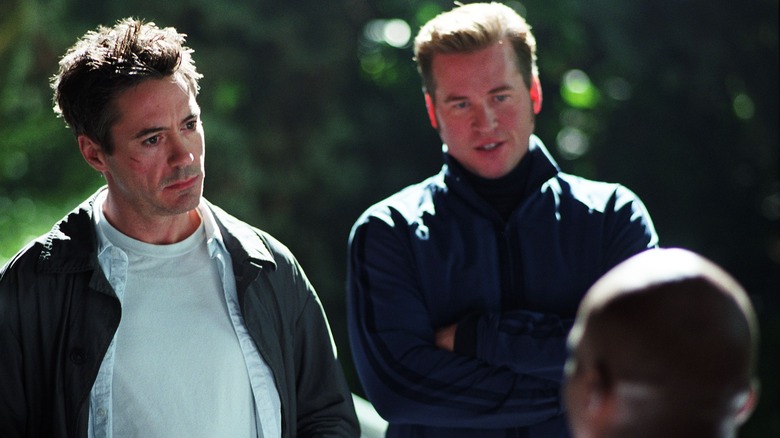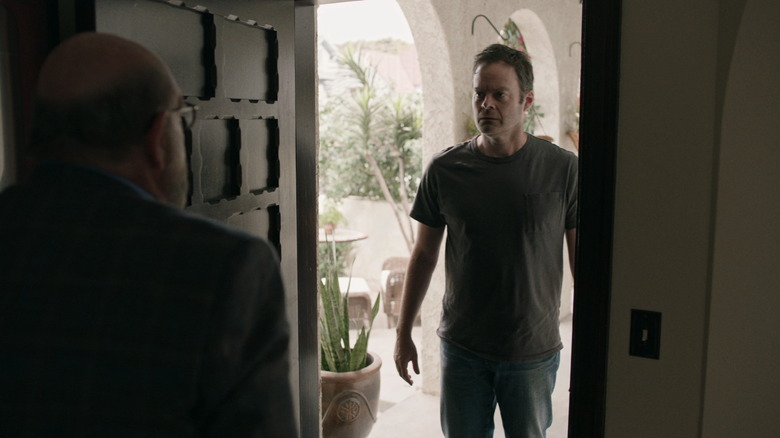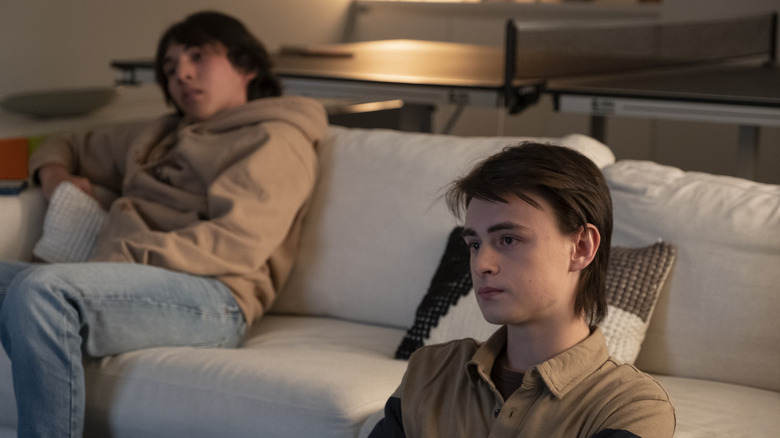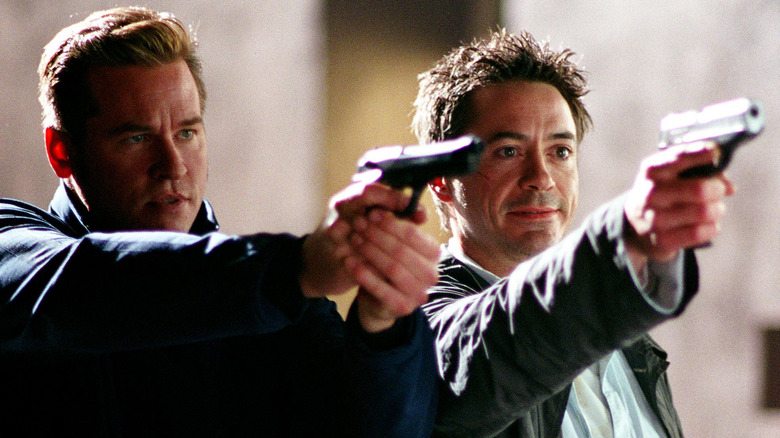The Barry Finale Recalls The Shane Black Classic Kiss Kiss Bang Bang
This article contains spoilers for the "Barry" finale as well as "Kiss Kiss Bang Bang."
Satire is one of the oldest artistic impulses; to mock and examine whatever systems, order, or supposed truths exist in any given era. Although cinema is a relatively young medium, it's no surprise that an enormous number of satires of the film and television industries have been made nearly since movies began.
HBO's "Barry," which concluded its four-season run this past Sunday night, proudly belongs to this long-standing tradition of biting the hand that feeds it, seeing as "Barry" is a highly cinematic TV series set in and around Hollywood. The grand satiric irony baked into the show's premise is the idea of a professional assassin, Barry Berkman (Bill Hader, who also co-created the show and directed the entirety of the last season), arriving in L.A. and deciding to try and have an acting career. The latent joke is, of course, that the showbiz world is just as morally corrupt and culturally suspect as an actual criminal underworld.
Concurrent with the requirements of satire as a genre, this heightened conflation of show business with crime and murder has been done before; films as varied as "Sunset Boulevard," "The Day of the Locust," "Who Framed Roger Rabbit," "The Player," "Showgirls," and "Maps to the Stars" explore the disparity between the glitz of entertainment and the bowels of depravity behind the scenes.
Yet the finale episode of "Barry" seems to recall one pitch-perfect showbiz satire-cum-crime film in particular: writer/director Shane Black's "Kiss Kiss Bang Bang" from 2005. Although "Barry" continues the tradition of all those other aforementioned films, it seems "Kiss Kiss Bang Bang" and its hilariously bitter combination of crime noir, tragedy, and irony is its closest antecedent.
The characters can't escape themselves
It's no accident that none of the protagonists of both "Barry" and "Kiss Kiss Bang Bang" are Hollywood success stories — instead, they're either washed-up has-beens or misguided hopefuls. In essence, both the series and the movie dangle the possibility of showbiz fame and fortune in front of their heroes only as a way to demonstrate the great lie that is Hollywood as well as show how these people can't escape their pasts.
In some cases, that last point is literal: where Barry's work follows him to L.A. in the form of his mentor/manipulator Fuches (Stephen Root), Harry Lockhart (Robert Downey Jr.) in "Kiss Kiss" is a small-time thief who barely manages to escape the law by unwittingly crashing an audition, his improvised performance impressing the casting people enough to send him to L.A. Ostensibly on the lam, Harry allows himself to be taken in by the promise of being cast in a major motion picture, being given "detective lessons" for his role by Hollywood hanger-on "Gay" Perry van Shrike (Val Kilmer).
Both Barry and Harry (nice rhyme there, no?) find themselves pretty quickly mired in life-or-death trouble that derails their acting careers. Barry has to deal with a myriad of piling-up issues surrounding his secret identity as a killer (which results in more dead bodies) while Harry and Perry (there it is again) are almost literally haunted by the corpse of Veronica Dexter, the daughter of actor Harlan Dexter (Corbin Bernsen) who is trying to get ahold of the inheritance left to her.
In the show as in the film, Hollywood is a bastion of escapism in every way, a path to reinvention as well as an absolution of sin. Neither Barry, Harry, Perry, nor their friends will achieve this because it was never actually achievable anyway.
Print the legend
As Carleton Young says in John Ford's "The Man Who Shot Liberty Valance:" "When the legend becomes fact, print the legend." Both "Barry" and "Kiss Kiss Bang Bang" face this uncomfortable, bitter truth about the way media operates in their final moments.
In "Kiss Kiss Bang Bang," Harry, Perry, and Harmony (Michelle Monaghan) successfully stop Dexter's scheme. However, they discover that Harmony's sister wasn't actually murdered, but died by suicide once she believed Dexter was sexually abusing his daughter, just as her own father abused her. In the movie's penultimate scene, Perry travels to the father's home, where he smacks the invalid man around as retribution. On the television, as he is leaving is a gaudy commercial for Gennaro's beer, in which Harmony has been replaced as the "Gennaro's Girl" by another actress that Harry and Harmony made fun of earlier in the film. As Black implies, the father's beating at the hands of Perry is the only true justice served in the movie: Dexter will continue to be a beloved actor, the victims will be forgotten, and Hollywood marches on.
That's much the same message at the close of "Barry," which sees a teenage John (Jaeden Martell), Barry's son with failed actress Sally Reed (Sarah Goldberg), surreptitiously watch the opportunistic biopic made about his father entitled "The Mask Collector." The film is just as garish as Gennaro's commercial, a cheesy action drama where fictional Barry Berkman (Jim Cummings) and Gene Cousineau (Michael Cumpsty) are a misunderstood hero and a devious criminal, respectively. Yet the movie solidifies John's father as his role model as well as gives Barry and Gene the absolution and fame they'd desperately wanted, albeit posthumously.
The happy marriage of crime noir and showbiz
Neither "Barry" nor "Kiss Kiss Bang Bang" wish to condemn Hollywood entirely — they're both too in love with cinema to do so, as evident in "Kiss Kiss" paying homage to numerous cinematic tropes (narration, flashbacks, multiple endings, etc.) and "Barry" constantly knowingly winking at the business of show (as evident in Sian Heder's appearance as herself earlier in season 4 as the director of a cheesy big-budget sci-fi movie).
Instead, they seek to point out the power imbalance and dangerous allure of Hollywood. Not only is it an industry that almost gleefully crushes the dreams of so many hopefuls (Harry's courting was just a way to use him to "shave a couple million off of Colin Farrell's price tag," Sally's show gets canceled for not hitting an algorithm's "taste clusters"), its fictionalized versions of reality range from irresponsible and uncaring to insultingly reprehensible, especially where actual victims (of murder or more) are involved.
Both "Barry" and "Kiss Kiss Bang Bang" are examples of Crime Noir fiction, and that subgenre frequently takes a grim view of humanity and its immorality. By setting their stories in and around the film industry, the series and the movie have the perfect juxtaposition for society's seedy underbelly, and they make great satiric use of it. Both works use comedy and satire to complicate the morality of their themes and characters — the majority of people in "Barry" are lovable despite their misdeeds, and "Kiss Kiss" is fully told by unreliable narrator Harry. Whether justice is served is, ultimately, beside the point; in the end, everything's all a show. As the lyrics for "That's Entertainment" from "The Band Wagon" state, "The world is a stage/the stage is a world of entertainment!" Barry, Harry, Perry, and company couldn't help but agree.



